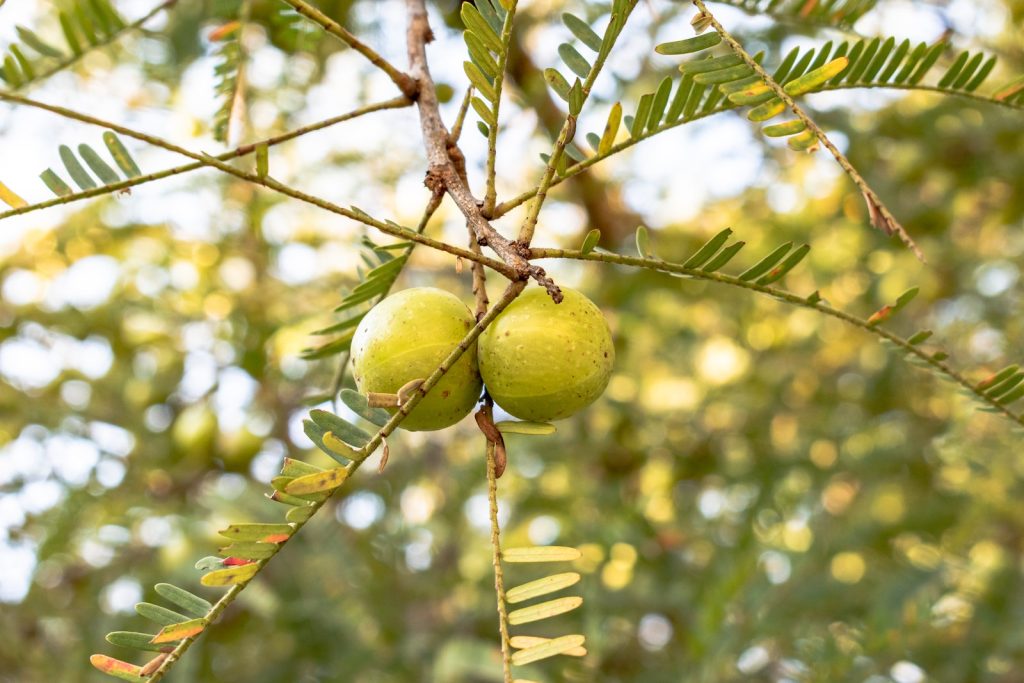Amla, also known as Indian gooseberry, is a fruit that has been used in Ayurvedic medicine for centuries. It is a rich source of vitamin C, antioxidants, and other nutrients that provide numerous health benefits. In this article, we will explore the various benefits of amla, including its ability to boost immunity, improve digestion, and promote healthy skin and hair.
Benefits of Amla
- Boosting Immunity: One of the primary benefits of amla is its ability to boost immunity. Amla is rich in Vitamin C, which is essential for strengthening the immune system. Vitamin C is a powerful antioxidant that helps protect the body against free radicals and oxidative stress. Amla also contains other antioxidants like flavonoids and polyphenols that further support immune function.
- Improving Digestion: Amla has been used in Ayurvedic medicine as a digestive aid for centuries. Amla contains fiber, which helps regulate bowel movements and prevent constipation. It also contains compounds that stimulate the production of digestive enzymes, which aid in the breakdown of food and the absorption of nutrients.
- Promoting Healthy Skin and Hair: Amla is also known for its ability to promote healthy skin and hair. Amla contains antioxidants that help protect the skin against damage from free radicals and UV radiation. It also contains collagen, which is essential for maintaining healthy skin and hair. Amla can be consumed orally or applied topically to the skin and hair for best results.
- Other Benefits: In addition to its primary benefits, amla also has numerous other benefits. It has been shown to lower cholesterol levels, regulate blood sugar levels, and improve cognitive function. Amla has also been used in traditional medicine to treat respiratory infections, inflammation, and liver disease.
Nutrition in Amla
Amla is a low-calorie fruit that is high in nutrients. One cup of amla contains:
- Calories: 44
- Carbohydrates: 11g
- Fiber: 7g
- Protein: 1g
- Fat: 0.5g
- Vitamin C: 214% of the Daily Value (DV)
- Vitamin A: 1% of the DV
- Iron: 2% of the DV
- Calcium: 3% of the DV
Uses of Amla
- Skincare: Amla can be used to make face masks and scrubs that help brighten and rejuvenate the skin.
- Haircare: Amla oil can be used to promote hair growth and prevent hair loss.
- Culinary: Amla can be used in cooking to add a tangy flavor to dishes or to make pickles and chutneys.
Also Read: Is Chapati Good for Weight Loss?
Amla Recipes
Amla Chutney:
Ingredients:
- 1 cup chopped amla
- 1/2 cup grated coconut
- 1/2 cup roasted chana dal
- 1 green chili
- Salt to taste
- Water as needed
Directions:
- Blend all the ingredients in a food processor until smooth.
- Serve with dosa, idli, or as a spread on toast.
Amla Juice:
Ingredients:
- 2 cups chopped amla
- 4 cups water
- 1/2 cup honey
- 1 tsp ginger juice
Directions:
- Blend the amla and water in a blender until smooth.
- Strain the mixture through a fine-mesh strainer.
- Add honey and ginger juice to the strained juice and mix well.
- Serve chilled.
Amla Pickle
Amla Pickle with Mustard Oil
Ingredients:
- 500g amla
- 1 cup mustard oil
- 2 tbsp fennel seeds
- 2 tbsp coriander seeds
- 2 tbsp cumin seeds
- 1 tbsp black peppercorns
- 1 tsp turmeric powder
- 1 tbsp red chili powder
- 2 tbsp salt
Instructions:
- Wash and dry the amla.
- Cut the amla into small pieces and remove the seeds.
- Roast the fennel, coriander, cumin, and black peppercorns in a pan until fragrant.
- Grind the roasted spices into a fine powder.
- In a separate pan, heat the mustard oil until it starts smoking.
- Remove the oil from the heat and let it cool for a few minutes.
- Add the ground spices, turmeric powder, red chili powder, and salt to the oil and mix well.
- Add the amla pieces to the oil and spice mixture and mix well.
- Transfer the pickle to a clean, dry jar and let it sit in a cool, dark place for a few days before consuming.
Sweet and Sour Amla Pickle
Ingredients:
- 500g amla
- 1 cup jaggery
- 1 cup vinegar
- 1 tbsp salt
- 2 tbsp red chili powder
- 1 tsp cumin powder
- 1 tsp coriander powder
- 1 tsp fennel powder
- 1 tsp mustard seeds
Instructions:
- Wash and dry the amla.
- Cut the amla into small pieces and remove the seeds.
- In a pan, heat the jaggery until it melts and starts to caramelize.
- Add the vinegar, salt, red chili powder, cumin powder, coriander powder, fennel powder, and mustard seeds to the pan and mix well.
- Add the amla pieces to the pan and mix well.
- Cook the mixture on medium heat for about 10-15 minutes, stirring occasionally, until the amla pieces are soft and the mixture thickens.
- Remove the pan from the heat and let the pickle cool down.
- Transfer the pickle to a clean, dry jar and store in the refrigerator.
Enjoy these delicious and healthy amla pickle recipes!
Can we eat amla at night?
Yes, it is safe to eat amla at night. In fact, consuming amla before bed can have several health benefits. Amla is rich in vitamin C, which is known to boost immunity and protect against various illnesses. Eating amla at night can help your body fight off infections while you sleep.
Additionally, amla is also known to have a calming effect on the body, which can help you sleep better. Amla contains certain compounds that can help regulate the levels of stress hormones in the body, promoting relaxation and better sleep.
However, it is important to keep in mind that consuming a large amount of amla before bed may cause indigestion or acidity in some people. Therefore, it is recommended to consume a moderate amount of amla and avoid eating it immediately before going to bed. Give your body enough time to digest the fruit before lying down.
Overall, consuming a moderate amount of amla at night can have several health benefits, but it is important to listen to your body and avoid overeating or consuming it too close to bedtime.
Also Read: Can We Eat Banana During Fever and Cold?
Side effects of eating amla during night times?
While consuming amla at night can have several health benefits, there are also some potential side effects that you should be aware of. These side effects may vary depending on the individual’s health status and how much amla they consume.
- Acid Reflux: Amla is rich in vitamin C, which can trigger acid reflux in some people when consumed in large amounts, especially at night. Acid reflux can cause discomfort, heartburn, and other digestive problems.
- Stomach Upset: Eating a large amount of amla at night can also cause stomach upset, including diarrhea, bloating, and gas. This is because amla contains a high amount of fiber, which can be difficult to digest in large amounts.
- Interference with Medications: Amla contains certain compounds that may interfere with some medications, such as blood thinners, anti-diabetic medications, and medications for high blood pressure. If you are taking any medications, it is important to talk to your healthcare provider before consuming amla regularly.
- Allergic Reactions: Some people may be allergic to amla or its components. Allergic reactions may include hives, itching, swelling, and difficulty breathing.
Overall, consuming a moderate amount of amla at night is generally safe and can have several health benefits. However, it is important to be aware of these potential side effects and talk to your healthcare provider if you experience any discomfort or have any concerns.
Conclusion
In summary, amla is a powerful fruit that has numerous health benefits. Its ability to boost immunity, improve digestion, and promote healthy skin and hair make it an excellent addition to any diet. If you’re looking to improve your overall health and wellbeing, consider adding amla to your daily routine.
Frequently Asked Questions
Is amla safe for pregnant women?
Yes, amla is safe for pregnant women and can provide numerous health benefits.
Can amla help reduce hair fall?
Yes, amla oil can help promote hair growth and prevent hair fall.
Is it safe to consume amla juice every day?
Yes, it is safe to consume amla juice every day in moderation.
Can amla help with diabetes?
Yes, amla has been shown to have anti-diabetic properties and can help regulate blood sugar levels.
How can I incorporate amla into my diet?
Amla can be consumed in various forms such as fresh, dried, juice, powder, or as an ingredient in dishes like pickles, chutneys, and curries.
Amla is a versatile fruit that can provide numerous health benefits. It can be consumed in various forms, and there are several recipes that you can try to incorporate amla into your diet. So, next time you’re looking for a healthy and tasty addition to your meals, give amla a try!







